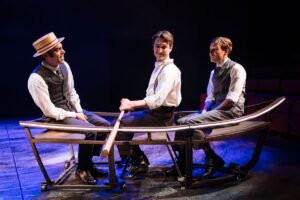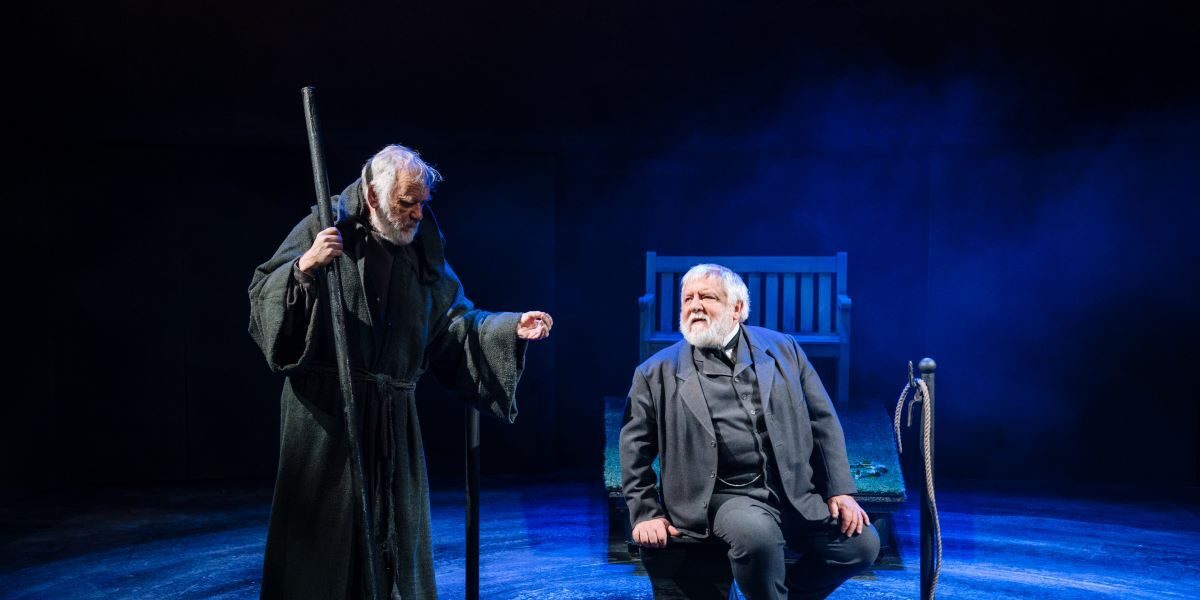One of my teachers once told me that the secret to a good lecture is to develop a single idea or concept to its fullest extent and not overcomplicate things. Lectures and plays are different types of performance art, yet Tom Stoppard’s The Invention of Love goes about as far in the opposite direction as anyone can. This play runs a breathtaking range of major themes, both personal and public, through its central character, the Victorian poet and classical scholar, A.E.Housman. Starting from the conceit that Housman has died and finds himself in Hades conversing with the world of his youth, we encounter Oxford in the golden era before World War One, the complex attractions of the study of the Classics, the furore around the Aesthetic movement, and above all the grim choices and consequences for a gay man in the era of the Labouchère amendment.
The nature of art, the tensions between scholarship and creativity, the anguished costs of repression and self-defeat versus defiance and self-immolation – these are only a few of the perennially important themes that are unforgettably evoked in the course of the evening. They are brought to a head in two great dialogues that crystallise the key issues: one between Housman and his younger self and another between Housman and Oscar Wilde in which the final ironic layers are peeled away to reveal modern romantic love as the ‘invention’ of the very genres and writers to whom Housman laboured to correct. The director rightly makes these exchanges the focus of her interpretation, and they were heard in concentrated silence on press night.
The difficulties of this play have been overstated – yes, there is a lot of Latin and Greek, but all the key points are translated; the most esoteric aspects of textual criticism and scholarship are illustrated with a combination of humour and poetic radiance that undercuts pretentious possibility; and the abundant layers of context fill out and moisturise what might too easily be taken to be the dessicated life of Housman himself. The fact that the run is extended and effectively sold out means we should never underestimate audiences who are prepared to go with the excitement and stimulus of material just within or slightly out of their reach, and embrace the challenge.

The acting is mostly immaculately apt. Simon Russell Beale is natural casting for the older Housman, and he does full justice to the eloquent complexity of the material entrusted to him, deploying an orchestral range of brilliant wit and searing melancholy. As his younger self, Matthew Tennyson is totally convincing: fizzing with intellectual energy, yet damped down by shyness and a hopeless passion for a hearty, athletic scientist who can never return his feelings. You can already see the older man in the younger. Dickie Beau makes the most of his impressive intervention as Oscar Wilde, while rightly avoiding any crude impersonation; and both Seamus Dillane and Ben Lloyd-Hughes are wholly plausible as Housman’s Oxford friends. There are excellent cameos from Alan Williams as a gruffly no-nonsense Charon, Florence Dobson, as Housman’s sister, and particularly from Michael Marcus, powerfully embodying an important alternative choice that Housman might have made.
The outer scenes of contextualisation in Oxford and London work less well. The acting of some of the cast is rougher and less sure-footed with the text (at least on press night), and the material seems overlong and lacking in dramatic impetus. It is a shame these filler scenes were not pruned, nearly thirty years on from the original production, especially now that the episodes they describe are better known and widely discussed.
The setting achieved by the creative team adds real value and distraction from the ethereal world of pure text. The thrust stage is painted with a vortex swirl behind which is a split-level set from which a bench, a sofa or Charon’s trolley-boat emerge at intervals. A three-part rowing boat ingeniously combines and recombines to summon up languid Oxford leisure and the world of Jerome K Jerome’s Three Men in a Boat. While the upper level of the set is a tad under-used, the wrap-around soundscape and lighting design do a good job of adding local atmosphere.
Some plays can be both great and flawed and this is one of them. But as Oscar Wilde gets to say in the play: ‘Better a fallen rocket than never a burst of light.’ You will struggle to get a ticket to this excellent revival; but you will also struggle to find a more rewarding theatrical night out among current offerings.
Tom Stoppard
Director: Blanche McIntyre
Cast: Simon Russell Beale, Dickie Beau, Stephen Boxer, Jonnie Broadbent, Seamus Dillane, Florence Dobson, Ben Lloyd-Hughes, Peter Landi, Michael Marcus, Dominic Rowan, Matthew Tennyson, Alan Williams
Until 1 February 2025
3 hrs with interval
Photo Credit: Helen Murray

